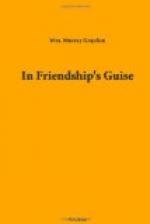Early in the afternoon Jack Vernon joined the group before the shop window; an interview with the editor of the Piccadilly Magazine had brought him to town, and, having read the papers, he had walked from the Strand over to Pall Mall. Memories of his Paris life, of the morning when he had trudged home in bitter disappointment to the Boulevard St. Germain and Diane, surged into his mind.
“It is the same picture that I copied at the Hotel Netherlands,” he said to himself, “and it ought to sell for a lot of money. How well I recall those hours of drudgery, with old Von Whele looking over my shoulder and puffing the smoke of Dutch tobacco into my eyes! I was sorry to read of his death, and the sale of his collection. He was a good sort, if he was forgetful. By Jove, I’ve half a mind to box up my duplicate and send it to his executors. I wonder if they would settle the long-standing account.”
Several hours later, when Jack had gone home and was hard at work in his studio, Victor Nevill sauntered down St. James street. He wore evening dress, and carried a light overcoat on his arm. He stopped at Lamb and Drummond’s window for a few moments, and scrutinized the Rembrandt carelessly, but with a rather curious expression on his face. Then he looked at his watch—the time was half-past five—and cutting across into the park he walked briskly to St. James’ Park station. The train that he wanted was announced, and when it came in he watched the row of carriages as they flashed by him. He entered a first-class smoker, and nodded to Stephen Foster. The two were not alone in the compartment, and during the ride of half an hour they exchanged only a few words, and gave close attention to their papers. But they had plenty to talk about after they got out at Gunnersbury, and their conversation was grave and serious as they walked slowly toward the river, by the long shady streets lined with villas.
Stephen Foster’s house stood close to the lower end of Strand-on-the-Green. It was more than a century old, and was larger than it looked from the outside. It had the staid and comfortable stamp of the Georgian period, with its big square windows, and the unique fanlight over the door. Directly opposite the entrance, across the strip of paved quay, was a sort of a water-gate leading down to the sedgy shore of the Thames—a flight of stone steps, cut out of the masonry, from the foot of which it was possible to take boat at high tide. In the rear of the house was a walled garden, filled with flowers, shrubbery, and fruit trees.
Opening the door with his key, Stephen Foster led his guest into the drawing-room, where Madge was sitting with a book. She kissed her father, and gave a hand reluctantly to Nevill, whom she addressed as Mr. Royle. She resumed her reading, perched on a couch by the window, and Nevill stole numerous glances at her while he chatted with his host.
The curio-dealer dined early—he was always hungry when he came back from town—and dinner was announced at seven o’clock. It was a protracted ceremony, and the courses were well served and admirably cooked; the wine came from a carefully selected cellar, and was beyond reproach. Madge presided at the table, and joined in the conversation; but it evidently cost her an effort to be cheerful. After the dessert she rose.




